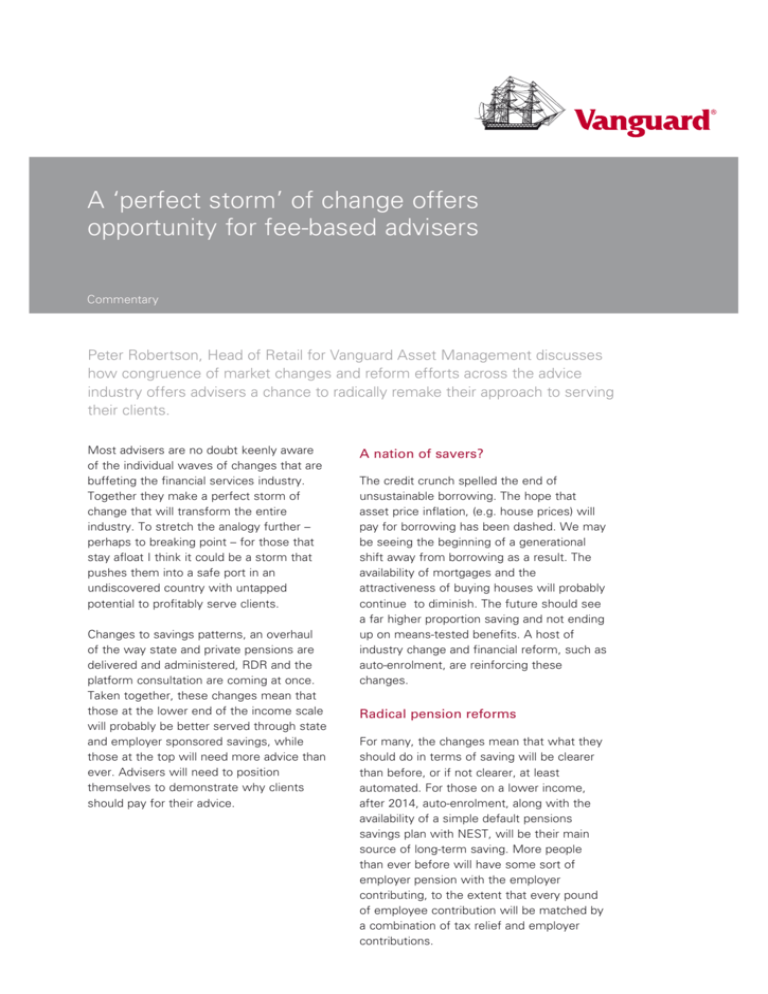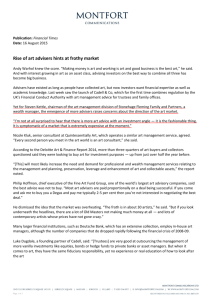
A ‘perfect storm’ of change offers
opportunity for fee-based advisers
Commentary
Peter Robertson, Head of Retail for Vanguard Asset Management discusses
how congruence of market changes and reform efforts across the advice
industry offers advisers a chance to radically remake their approach to serving
their clients.
Most advisers are no doubt keenly aware
of the individual waves of changes that are
buffeting the financial services industry.
Together they make a perfect storm of
change that will transform the entire
industry. To stretch the analogy further –
perhaps to breaking point – for those that
stay afloat I think it could be a storm that
pushes them into a safe port in an
undiscovered country with untapped
potential to profitably serve clients.
Changes to savings patterns, an overhaul
of the way state and private pensions are
delivered and administered, RDR and the
platform consultation are coming at once.
Taken together, these changes mean that
those at the lower end of the income scale
will probably be better served through state
and employer sponsored savings, while
those at the top will need more advice than
ever. Advisers will need to position
themselves to demonstrate why clients
should pay for their advice.
A nation of savers?
The credit crunch spelled the end of
unsustainable borrowing. The hope that
asset price inflation, (e.g. house prices) will
pay for borrowing has been dashed. We may
be seeing the beginning of a generational
shift away from borrowing as a result. The
availability of mortgages and the
attractiveness of buying houses will probably
continue to diminish. The future should see
a far higher proportion saving and not ending
up on means-tested benefits. A host of
industry change and financial reform, such as
auto-enrolment, are reinforcing these
changes.
Radical pension reforms
For many, the changes mean that what they
should do in terms of saving will be clearer
than before, or if not clearer, at least
automated. For those on a lower income,
after 2014, auto-enrolment, along with the
availability of a simple default pensions
savings plan with NEST, will be their main
source of long-term saving. More people
than ever before will have some sort of
employer pension with the employer
contributing, to the extent that every pound
of employee contribution will be matched by
a combination of tax relief and employer
contributions.
Some of the funds these types of people
end up in, be it in NEST or an employer
scheme, will include elements of ‘embedded
advice’, such as Target Date Funds. These
will automatically adjust portfolio allocations
as the investors in the fund approach
retirement. The simple embedded advice
solution implied by NEST for lower income
earners, something that is conveniently
forgotten by some in the industry who attack
RDR on the grounds that it will deprive lowincome earners of the benefits of financial
advice. The combination of ‘embedded
advice’ and employer contributions will
significantly reduce this group’s need for
individual advice.
The lower income brackets will thus
potentially have more wealth in retirement,
with a simplified higher state pension, even
if they do have to work longer to get it.
Simplicity for some, complexity for
others
Even as the government announces plans for
further simplification of state pensions, those
farther up the income scale potentially face
more complexity and a need for more advice.
As a result, those at the top end of the
pensions and investing market offer the
greatest opportunity for fee-based advisers
in the new world.
They will garner much less significant
benefits from their employer with the end of
Defined Benefits schemes. This has already
occurred in most of the private sector with
the switch to defined contributions, and is on
the way in the public sector.
At the same time, they will have a far greater
range of options for what they do with their
money, with more platforms, a greater range
of products and scope for drawdown
throughout retirement. With more choice,
comes the need for the expertise and
perspective that a highly professional and
qualified adviser can give. This sector of the
market has the greatest motivation to seek
unbiased advice and the means to pay for
fees to get it.
The opportunities for fee-based
advisers
Those advisers that embrace the changes
will thrive. The ban on commission and
burgeoning requirements for qualifications
and development will place huge demands
on the advice community. But at the same
time, those two things will generate more
trust in clients, with greater confidence that
advice is both impartial and sound.
No doubt, advisers will have to revise their
proposition to focus more on the high-networth segments, away from those whose
saving needs are served by auto-enrolment
and higher basic state pensions. The
wealthy, now have even more choice, but
Decile
Investable
Wealth*
% held
1
2,448,300
54
2
856,800
19
3
508,400
11
4
303,200
7
5
181,000
4
6
112,800
2
7
75,200
2
8
31,700
1
9
5,000
0
– 8,200
0
4,514,200
100
10
Total
face higher taxes. They may only be 30% of
the population but has over 80% of the
wealth and could provide the base for fees.
There are 2.6 million such households in the
top 10% alone1 and that’s arguably enough
for all the fee based advisers if we assume
150-2002 clients for each of the expected
15,0002 firms post RDR.
To thrive, not just survive the perfect storm,
they will need to focus on those clients
with the means and motivation to seek and
pay for their advice. But to succeed, they
will need to embrace change and put in
place new systems and processes with
only the client in mind because after all,
only the client will pay them.
84% of the investable wealth in the
UK is held by the top 30% of
households, with more need for
advice from fee-based advisers.
Those on modest incomes, 70% of
households, hold only 16% of wealth.
They will be better served as a result
of pension reform, with a lowered
requirement for advice.
*Net financial & pension wealth, excluding physical and property assets. 26 million households in total at time of study, divided into 10%
bands (2.5 million each).
Source: Wealth and Assets Survey, Office for National Statistics.
1 Source: Wealth and Assets Survey, Office for National Statistics.
2 Vanguard estimates.
Connect with Vanguard™ > vanguard.co.uk
> Adviser support > 0800 917 5508
Important information
This document is directed at investment professionals and should not be distributed to, or relied upon by retail investors. Vanguard Asset Management, Limited only
gives information on products and services and does not give investment advice based on individual circumstances. The value of investments, and the income from them, may fall or
rise and investors may get back less than they invested.
The material contained in this document is not to be regarded as an offer to buy or sell or the solicitation of any offer to buy or sell securities in any jurisdiction where such an offer or
solicitation is against the law, or to anyone to whom it is unlawful to make such an offer or solicitation, or if the person making the offer or solicitation is not qualified to do so.
The information on this document does not constitute legal, tax, or investment advice. You must not, therefore, rely on the content of this document when making any investment
decisions.
Issued by Vanguard Asset Management, Limited which is authorised and regulated in the UK by the Financial Services Authority.
© 2011 Vanguard Asset Management, Limited. All rights reserved.
UK11/0920/1011









